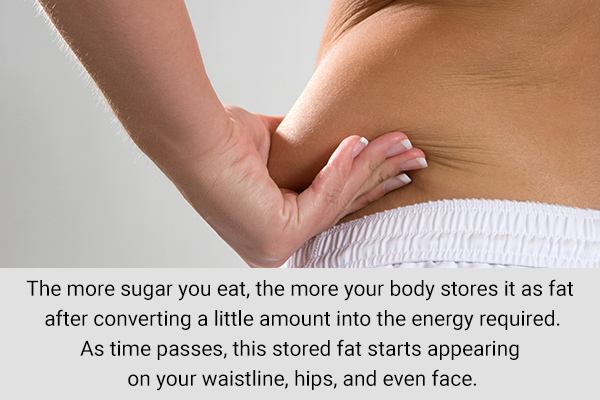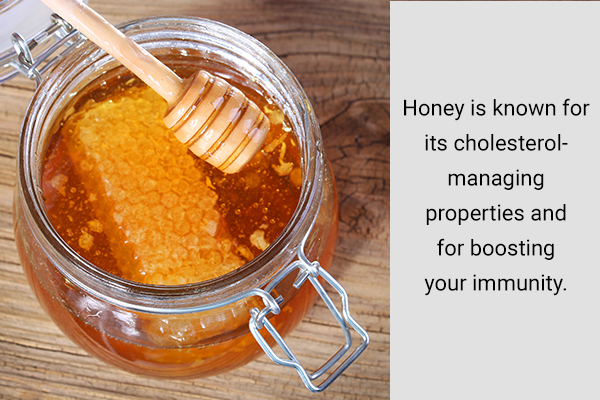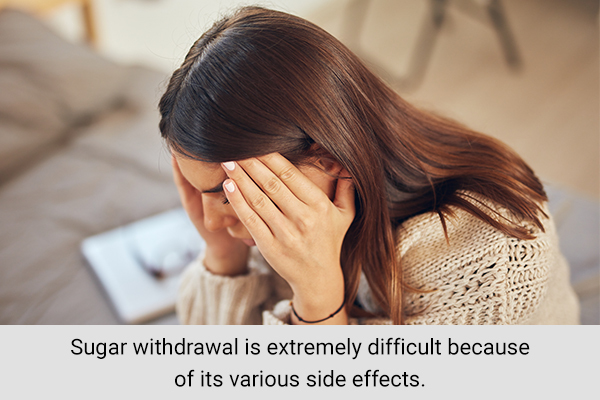In this article:
You must have heard, at least once in your lifetime, that sugar is your best dietary enemy. But it is extremely hard to not eat sugar because of how good it makes food taste, and all its mouthwatering dishes are almost impossible to forgo.

However, what you don’t realize is that your sweet tooth can be very dangerous and not so sweet for your health.
The small amount of sugar that is naturally found in fruits and vegetables is completely fine to consume. The issue arises when you consume foods and beverages that have artificially added sugar such as chemical sweeteners.
Even if packaged food does not have artificial sweeteners, they still have higher than the recommended sugar content. This added sugar is the main culprit of today’s unhealthy diet in the developed world.
This kind of sugar only added calories with no other nutritional value. It is found in almost everything you can buy at a grocery store, from colas and sodas to cookies and cakes.
Effects of Quitting Sugar
These are the things that will happen to your body when you completely give up sugar. (1)
1. Increases energy levels
Consuming very high amounts of sugar can make you feel less energized and lethargic most of the time. It can also make you feel easily exhausted with mood swings and irritability. These happen because consumption of high amounts of sugar causes an increase in tension.
Eating sugar does raise energy levels initially but later causes a sharp and drastic drop. (2) A recent study found a link between increased consumption of sugar and low physical activity. (3)
Sugar also gets broken down in the body very quickly, which causes your blood sugar levels to rise suddenly. A sugar-filled diet also has negative impacts on your brain, neurons, digestive system, and muscles. (4)
2. Can help in weight loss

A sugary diet only provides your body with empty calories that carry no nutritional value. This leads to quick weight gain.
The more sugar you eat, the more your body stores it as fat after converting a little amount into the energy required. As time passes, this stored fat starts appearing on your waistline, hips, and even face.
If you decide to quit sugar, you may be able to lose the extra weight, thereby preventing health issues that arise from obesity. (5)
3. Lowers the risk of diabetes
Eating a lot of sugar may lead to the deposition of fat around the liver, contributing to insulin resistance.
Insulin is a hormone that reduces glucose levels in the blood and increases cellular intake of glucose. If cells become resistant to insulin, glucose levels in the blood rise, paving a path to diabetes. (6)
Quitting sugar and having a well-balanced control diet will be helpful in avoiding the risk of developing diabetes. Those who are prediabetic or have a family history of diabetes should do their best in cutting out sugar in their diet. (7)
4. Improves oral health
As a kid, you have been told how candies and sweets are not good for your teeth. Sugar and oral health don’t go together. A very-high-sugar diet leads to unfortunate effects on your oral health. (8)
The mouth is home to thousands of bacteria that feed on sugar. Increased sugar intake provides them with more sugar to feed on, leading to the production of excessive acid. This acid can then destroy the enamel that is there to protect the teeth.
All these can further lead to cavities, dental caries, and, worst, tooth loss. (9)
Controlling your sugar intake can do wonders for your oral health. It is important for keeping your teeth healthy and strong.
5. Improves quality of sleep

Lowering your sugar intake leads to a healthy blood sugar level and increases the level of serotonin in your brain. Both these factors contribute to a good quality of sleep.
Moreover, orexin, which is a neurotransmitter in your body that is important for keeping you alert, awake, and focused during the day, is glucose sensitive. Its functioning is suppressed with increased blood glucose levels. (10)
Limiting sugar will promote better sleep with suppressed orexin activity at night. Thus, limiting your sugar intake is extremely important for a good quality of sleep.
Additionally, refined sugar decreases the degree of slow-wave sleep, which is restorative sleep. So, quitting sugar is important for keeping your memories intact and processing the information you had learned throughout the day. (11)(12)
6. Improves heart health
Ditching sugar helps lower your blood cholesterol levels and improves heart health. High sugar intake stimulates your flight and fight response as it activates your sympathetic nervous system. Such a response leads to increased blood pressure and heart rate. (13)
All these put added load on your heart, causing possible damage to your cardiovascular system and increasing your risk of heart problems such as heart attacks, strokes, and coronary artery disease.
Quitting sugar also causes a decrease in the levels of triglycerides and bad cholesterol, also known as low-density lipoprotein (LDL). (14)
7. Rejuvenates the skin
Quitting sugar is good for strengthening elastin and collagen. It also contributes to reducing the level of inflammation, which is necessary for healthy skin.
Consuming high amounts of sugar disrupts the repair of your skin’s collagen and also leads to reduced elasticity and premature signs of aging such as wrinkles. (15)(16)
Sugar Alternatives You Can Try
Fortunately, there are a lot of sugar alternatives you can choose from.
1. Honey

Raw honey, derived organically, is the best alternative to sugar. It contains antioxidant properties and vitamins. Honey is known for its cholesterol-managing properties and for boosting your immunity. (17)
2. Jaggery
Jaggery is made from unrefined sugar and, like honey, is rich in antioxidants. It also contains minerals that have anti-aging properties. Moreover, jaggery prevents constipation and thereby is good for detoxification. (18)
3. Dates
Dates are a known superfood. They are wholesome in their nutritional value and contain dietary fibers. They are a great source of iron, calcium, zinc, and other minerals. (19)
4. Coconut sugar
Coconut sugar is made by treating the buds of coconut trees. It is known for its rich content of calcium, iron, and antioxidants. (20)
5. Maple syrup
Maple syrup is a concentrated syrup derived from the sap of maple trees. It also contains high amounts of antioxidants and is a great alternative to white sugar. (21)
ALSO READ: Lose Weight, Feel Better – Sugar Detox in Just 3 Weeks
Most-Asked Questions About Quitting Sugar
Why is it hard to quit sugar?
Sugar causes a release of the hormones serotonin and dopamine, which are known as feel-good or happy hormones. They are responsible for your body’s reward system.
So, it can be immensely hard to give up on sugar, especially when it is a famous ingredient in many enjoyable foods from soft drinks to desserts. (22)
What are the symptoms of sugar withdrawal?

Sugar withdrawal is extremely difficult because of its various side effects, (23) which include:
- Headache
- Lethargy
- Drowsiness
- Muscle pain
- Nausea
- Sugar craving
- Mood swings
- Anxiety
How much sugar can I consume in a day that is healthy?
Studies show sugar intake should not account for more than 5% of your calorie intake. This can be somewhere around 100–150 kcals per day per person. (24)
Final Word
Sugar, although appetizing, is incredibly harmful to you if not eaten in moderation. Diets nowadays contain very high amounts of sugar and sometimes even dangerous artificial sweeteners.
It contributes to the growing risk of noncommunicable chronic diseases in the world such as diabetes, heart problems, and kidney issues. All of these can be prevented or at least their risk lowered by limiting sugar intake.
Try replacing your sugar with protein-packed food such as meat, fish, egg, pulses, and legumes. Consuming naturally occurring sugar present in food and vegetables is also a great way of fulfilling your sugar cravings without any harm to your body. (25)
It is hard to give up sweets, but it is also important for a healthy version of yourself.
- Was this article helpful?
- YES, THANKS!NOT REALLY


